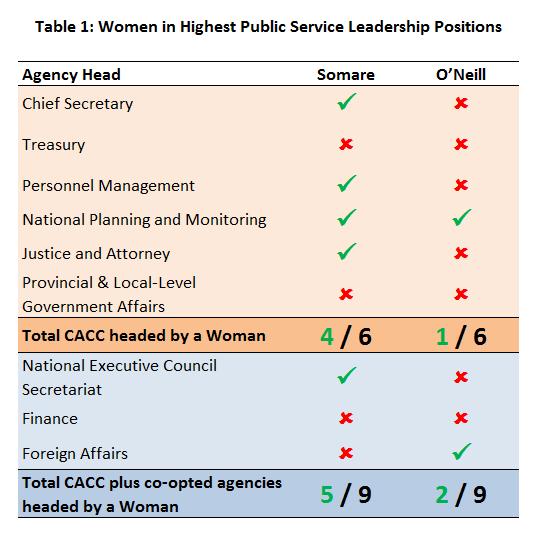There are many inequalities in Papua New Guinea that need to be addressed urgently, one is the gender divide. Let’s examine one particular aspect of this, how the O’Neill Government has tackled gender imbalance in leadership with its appointments to the most senior roles within the public service. I am particularly interested in whether women have been given responsibility to lead within the inner core of the public sector – the Central Agencies Coordinating Committee (CACC).
O’Neill in his International Women’s Day statement this year said “We can be proud that today we have more women in senior roles than at any other time in our history” (see here). But is this true for the most senior roles in the public service? Sadly, it is not!
CACC members are the group of agencies that sit above other agencies within the public sector. The Prime Minister and National Executive Council Act (section 24) sets out the members of CACC. Their departmental heads and staff get paid better than other public servants reflecting their immense authority and roles as gatekeepers. If you need budget funding you have to get past Departments of Treasury and National Planning; if you need legal clearance or advice you have to get past Department of Justice and Attorney General. Department of Provincial & Local-level Government Affairs oversight provinces where the bulk of our people reside. And of course, Chief Secretary and Secretary for National Executive Council Secretariat guard the doors to Prime Minister and Cabinet. Three other agency heads – Finance, Foreign Affairs and NEC Secretariat, are apparently co-opted to be members of CACC though there is no legal basis for this.

What Table 1 shows is that the Somare Government has a better record than the O’Neill Government with gender representation amongst CACC agency heads. At one time or another during Grand Chief Sir Michael’s final tenure as Prime Minister his Government filled four of the six seats with women. Yes, this wasn’t done concurrently and two of the six seats were occupied at different times by one woman. The tabulation does include acting appointments as only NEC has the authority under the Public Services (Management) Act to do this. In addition, acting Secretaries exercise the same power and authority of a permanent appointment.
The O’Neill Government has only filled one CACC position with a woman compared to the Somare Government which filled five. The single permanent appointment made by the current government was already filled by two successive women prior to this (even if only an acting basis). When we add the co-opted CACC members as done at the bottom of Table 1 we see that the Somare Government placed women into five of the nine positions whilst the O’Neill Government only appointed two.
Under O’Neill’s tenure there has been a regression not only with appointments of women to the core policy and administrative agencies but the system of appointments. The O’Neill Government swept aside the merit-based appointment process and tried to dismantle the Public Service Commission (PSC), a constitutional office no less, and to transfer its powers to a Ministerial Executive Appointments Committee – that comprises a subset of 4 ex-officio Ministers and yes currently all of them are men. The PSC has taken the fight to Government challenging the constitutional validity of the legislative changes made that effectively politicizes the appointment and removal process for heads of public bodies (see here). This disturbing change of regime has the real potential to further erode the capabilities of a hapless public sector and to undermine good governance and quality development outcomes for Papua New Guinea.
There are many smart women that are capable of occupying those key bureaucratic positions but aren’t being given the opportunity. Our country has had some real trailblazers with outstanding women reaching the highest echelons of their professions (on which see here). Papua New Guinean girls and boys need contemporary role models and several CACC agencies have capable women as Deputy Secretaries that are ready to step up to the next level. The O’Neill Government has regressed in ensuring gender inclusion in senior leadership in the public sector so we look to the incoming government with the message – it is time to be bold for change.